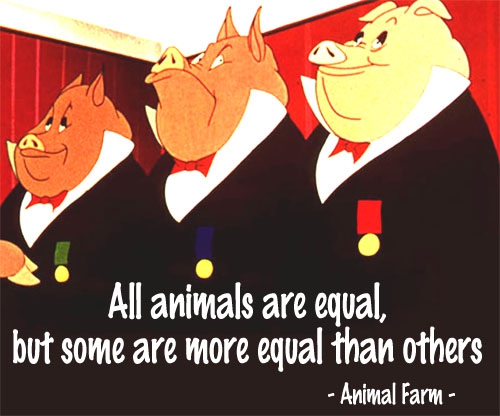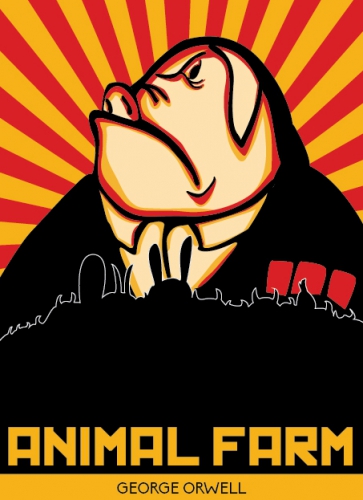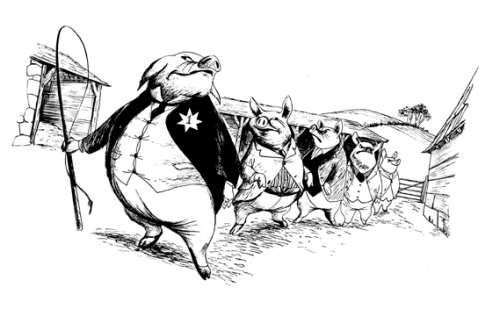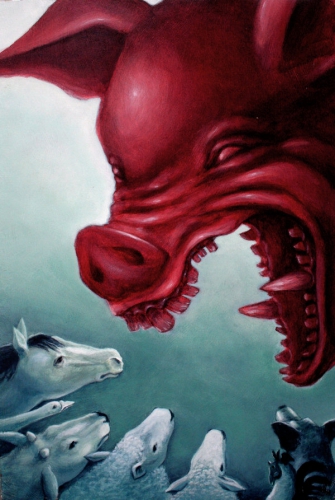mercredi, 12 juillet 2017
Animal Farm: Beware of the Language of Equality

Animal Farm: Beware of the Language of Equality
by
Ex: http://www.eurocanadian.ca
The impulse for writing this brief essay comes from teaching the book for several years abroad. In my simple observations about the work, I've employed a medical analogy, whereby, Old Major is a social physician; his patient is the ailing, but equally oblivious, population of farm animals, and the illness is the daily life on that farm, owned by Mr. Jones. This analysis of Animal Farm follows a therapeutic progression: from a diagnosis, to a prescribed therapy, and ending finally in a description of a state of health that should result if the treatment is followed. In contrast to the usual interpretation of Animal Farm which highlights Orwell's famous quote that "all animals are equal, but some animals are more equal than others," the message of this medical analogy is that those who control language control politics and power.
In this respect, I'm aware of how Orwell uses Old Major to dramatize Karl Marx's critique of the struggle between owners and workers. But Orwell goes further, with important insights for the Alt Right. Aware that "Convictions are more dangerous enemies of truth than lies," Orwell puts aside whatever his sympathies with the workers might be; he challenges the idea that "All animals are equal." First, he shows the failure of this idea by focusing on who controls language, and then he presents reasons why equality among all the animals might not be all that desirable. In doing this, Orwell went against the egalitarian impulses of his day, displaying an intellectual originality that is rightly admired but perhaps all too seldom imitated.
What Old Major offers the other animals is a diagnosis of the exploitation and unfairness that infects daily life on the farm. He states:
To treat the pandemic injustices of Manor Farm, Old Major prescribes the therapy of rebellion. Speaking to the animals gathered in the barn, Old Major says:
But having always experienced inequality, the animals don't know what equality is, so Old Major has to show them. He does so in two ways: he addresses all the animals by the revolutionary sobriquet of "Comrade." All the animals are "comrades." Therefore, according to Old Major, "all animals are equal." Old Major further shows this to be true with the power of the vote. Each animal has a vote. The donkey's vote is no less a vote than the horse's vote. A pig's vote is no more a vote than a sheep's vote. Simply put, a vote is a vote is a vote. All votes are equal; consequently, all animals are equal. Yet readers must acknowledge this animal egalitarianism is only Old Major's hope for the future and not quite the reality, especially under the rule of the pigs.
Language is a measure of power on the Animal Farm. The pigs give the sheep their slogans "Four legs good, two legs bad," and "Four legs good, two legs better." The sheep are incapable of coming up with their own slogans. They're illiterate and under the control of the pigs. The sheep mindlessly memorize and repeat slogans at the pigs' behest. If Wittgenstein is right when he claims, "The limits of my language are the limits of my world," then clearly the sheep have a small world. But even more revealing might be the application of Wittgenstein's idea to describe the relationships of power on the Animal Farm: the limits of language are the limits of power. It is, therefore, no accident that the sheep have the least language and the least amount of power while the pigs have the most language, and the most power. The pigs, after all, write and revise the rules that govern life on the farm for all the animals. However, language alone doesn't separate the pigs from the others.
Snowball is able to become the hero of the Battle of the Cowshed not only because of language but because of leisure. Orwell describes an ordinary day on the farm shortly after the rebellion:
Food not only is the product of the farm, but it is also proof that the egalitarian revolution of Animalism has failed. When the animals returned from a long day's work in the fields, they realized that "the milk had disappeared." If life on Animal Farm were truly egalitarian, wouldn't each animal get a portion of milk? Of course they would. But that doesn't happen. As Napoleon said, "Never mind the milk, comrades!" This inequality with food resources continues throughout the novel. Though the "animals had assumed" that the windfall apples "would be shared out equally," they soon learned that "all the windfalls were [...] for the use of the pigs." And even as the farm faces the winter hardship of food shortages, not all animals make equal sacrifices: "[A]ll rations were reduced, except those of the pigs and dogs." There are many examples of inequality on the Animal Farm that result from power, greed and the pigs' preference for pigs over other animals on the farm. But the most formidable and unyielding source of inequality might be Nature itself.
Maybe we would like to believe that the failure of animal egalitarianism wasn't inevitable. But the truth, however, might be that it truly was never possible. The pigs have a natural advantage the other farm animals lack. Orwell writes that the pigs "had taught themselves to read and write." This auto-didactic aptitude for reading and writing reveals more than a few not insignificant natural abilities that the pigs have. The pigs have a passion for learning, for teaching themselves new abilities without being prompted to do so by others; moreover, what the pigs teach themselves is equally important because "to read and write" is to have power over others on the farm. The other farm animals are aware that the pigs are "manifestly cleverer" and therefore, "should decide the questions of farm policy." Nature has made the pigs different. And as Freud observes:
The dream of Old Major's egalitarianism turns into a nightmare under Napoleon's rule, and disagreement is outlawed through violence. One of Boxer's favorite slogans is "Napoleon is always right." He speaks more truth than he understands. Napoleon is always right. If he isn't, he exiles you or kills you. All animals are equal under Napoleon because they're all unable to dissent. Conformity is the unwritten law of Animal Farm. And its immediate consequences can't be ignored: countless deaths and tyranny; however, its unseen insidious effects are more dangerous. Maybe the windmill really fell because Benjamin refused to speak up. Since he "could read as well as any pig," who is to say that he didn't recognize the windmill's flaw of thin walls. If he realized the flaw, could it be that he chose to remain silent out of self-preservation? The silence of conformity comes at a cost: progress. As William Blake writes, "Without contraries is no progression." Doubtless, dissent is essential for progress and a healthy society. Silence puts an end to progress, and the tyranny of Napoleon turns even language into a weapon against the unsuspecting animals.
If you can say it, you can think it; you can do it. For this very reason, Napoleon bans "Beasts of England." Having witnessed the execution of their comrades by Napoleon's dogs, the farm animals retreat to the knoll and sing the song as an act of solace. Shortly afterwards, Squealer arrives. Orwell writes:
Orwell's work is rare in the world of books, and we do him the honor he deserves by reading it and reading it again. In Animal Farm, while sympathizing with the exploited and the urge for equality, he warned against the manipulation of those in control of the language of egalitarianism, the naive denial of the inescapable reality that animals and humans are not naturally equal, and that we must be wary of those who will manipulate us with words to believe we can be equal while not allowing open discussion about nature's inequalities.
The impulse for writing this brief essay comes from teaching the book for several years abroad. In my simple observations about the work, I've employed a medical analogy, whereby, Old Major is a social physician; his patient is the ailing, but equally oblivious, population of farm animals, and the illness is the daily life on that farm, owned by Mr. Jones. This analysis of Animal Farm follows a therapeutic progression: from a diagnosis, to a prescribed therapy, and ending finally in a description of a state of health that should result if the treatment is followed. In contrast to the usual interpretation of Animal Farm which highlights Orwell's famous quote that "all animals are equal, but some animals are more equal than others," the message of this medical analogy is that those who control language control politics and power.
In this respect, I'm aware of how Orwell uses Old Major to dramatize Karl Marx's critique of the struggle between owners and workers. But Orwell goes further, with important insights for the Alt Right. Aware that "Convictions are more dangerous enemies of truth than lies," Orwell puts aside whatever his sympathies with the workers might be; he challenges the idea that "All animals are equal." First, he shows the failure of this idea by focusing on who controls language, and then he presents reasons why equality among all the animals might not be all that desirable. In doing this, Orwell went against the egalitarian impulses of his day, displaying an intellectual originality that is rightly admired but perhaps all too seldom imitated.
I. Diagnosis—Medical Analogy
What Old Major offers the other animals is a diagnosis of the exploitation and unfairness that infects daily life on the farm. He states:
We are born, we are given just so much food as will keep the breath in our bodies, and those of us who are capable of it are forced to work to the last atom of our strength; and the very instant that our usefulness has come to an end we are slaughtered with hideous cruelty.Old Major educates the farm animals, making them aware that this is unhealthy. The animals "are forced to work," doing the most burdensome work to exhaustion, and in return, they only receive "just so much food as will keep the breath" in them — so that they can continue to work. As Old Major understands life on the farm, work is a major measure of value for most animals, and "the very instant that our usefulness has come to an end we are slaughtered." Even at the end of a life-time of loyal labour on Manor Farm, animals don't get to enjoy retirement. Instead, they are mercilessly eliminated. Old Major assures Boxer that no animal is immune to this outcome: "the very day those great muscles of yours lose their power, Jones [...] will cut your throat and boil you down for the foxhounds." As with any good doctor, Old Major knows that it isn't enough to diagnose correctly the patient. The treatment must cure the illness.

II. Treatment
To treat the pandemic injustices of Manor Farm, Old Major prescribes the therapy of rebellion. Speaking to the animals gathered in the barn, Old Major says:
[W]ork night and day, body and soul, for the over throw of the human race! That is my message to you, comrades: Rebellion!A reader might ask: Why do the ills of Manor Farm have to be treated by the harsh remedy of rebellion? Any increase in animal rights is a decrease in Jones' control. Any further sharing out of resources diminishes profit for Jones. Moreover, not yet unified with the other animals by hunger, the individual animal poses no threat to Jones. The lone animal can't stand against the immediate punishment of a beating or starvation. Divided, the animals don't have power. Without power, negotiation is impossible. Jones doesn't need to compromise, so why would he? People in power rarely like to share it. The only recourse the animals have, therefore, is to take and redistribute power through violent revolution. Old Major believes that this forceful redistribution of power on the farm will be the end of inequality and making of a society based on harmonious relations without exploitation.
III. State of Health
But having always experienced inequality, the animals don't know what equality is, so Old Major has to show them. He does so in two ways: he addresses all the animals by the revolutionary sobriquet of "Comrade." All the animals are "comrades." Therefore, according to Old Major, "all animals are equal." Old Major further shows this to be true with the power of the vote. Each animal has a vote. The donkey's vote is no less a vote than the horse's vote. A pig's vote is no more a vote than a sheep's vote. Simply put, a vote is a vote is a vote. All votes are equal; consequently, all animals are equal. Yet readers must acknowledge this animal egalitarianism is only Old Major's hope for the future and not quite the reality, especially under the rule of the pigs.
IV. Language as a Measure of Power—Breakdown of Egalitarianism
Language is a measure of power on the Animal Farm. The pigs give the sheep their slogans "Four legs good, two legs bad," and "Four legs good, two legs better." The sheep are incapable of coming up with their own slogans. They're illiterate and under the control of the pigs. The sheep mindlessly memorize and repeat slogans at the pigs' behest. If Wittgenstein is right when he claims, "The limits of my language are the limits of my world," then clearly the sheep have a small world. But even more revealing might be the application of Wittgenstein's idea to describe the relationships of power on the Animal Farm: the limits of language are the limits of power. It is, therefore, no accident that the sheep have the least language and the least amount of power while the pigs have the most language, and the most power. The pigs, after all, write and revise the rules that govern life on the farm for all the animals. However, language alone doesn't separate the pigs from the others.

V. Leisure
Snowball is able to become the hero of the Battle of the Cowshed not only because of language but because of leisure. Orwell describes an ordinary day on the farm shortly after the rebellion:
The pigs did not actually work, but directed and supervised the others. With their superior knowledge it was natural that they should assume the leadership.The pigs do have language ability to a high degree above the other animals. This "superior knowledge" of language is what makes it "natural that they should assume the leadership." Of course, later Snowball clearly makes use of this "superior knowledge" of language by reading about the campaigns of Julius Caesar. Snowball 's learning allows him to organize and direct the animals to defend themselves against the attacking humans; however, without leisure, even the most useful books remain unread. Therefore, it is not insignificant that the "pigs did not actually work;" un-tired at night, the pigs are holed up in the harness-room, studying "from books." There's an undeniably intimate connection between leisure and learning that enables Snowball to be heroic. Even the modern story-tellers of Hollywood can't ignore this fact. That is why the bat-suited hero of Gotham is the leisured Bruce Wayne during the day. Moreover, the iron-clad Tony Stark is equally free from draining daily work when he's not putting in a shift as Iron Man. In understanding Animal Farm, we shouldn't overlook the importance of leisure. Orwell and Hollywood might agree at least on this point: leisure doesn't make a person heroic, but it is awfully difficult to be heroic without leisure. But leisure isn't the only resource where the animals are found to be unequal.
VI. Food
Food not only is the product of the farm, but it is also proof that the egalitarian revolution of Animalism has failed. When the animals returned from a long day's work in the fields, they realized that "the milk had disappeared." If life on Animal Farm were truly egalitarian, wouldn't each animal get a portion of milk? Of course they would. But that doesn't happen. As Napoleon said, "Never mind the milk, comrades!" This inequality with food resources continues throughout the novel. Though the "animals had assumed" that the windfall apples "would be shared out equally," they soon learned that "all the windfalls were [...] for the use of the pigs." And even as the farm faces the winter hardship of food shortages, not all animals make equal sacrifices: "[A]ll rations were reduced, except those of the pigs and dogs." There are many examples of inequality on the Animal Farm that result from power, greed and the pigs' preference for pigs over other animals on the farm. But the most formidable and unyielding source of inequality might be Nature itself.
VII. Nature Isn't Egalitarian
Maybe we would like to believe that the failure of animal egalitarianism wasn't inevitable. But the truth, however, might be that it truly was never possible. The pigs have a natural advantage the other farm animals lack. Orwell writes that the pigs "had taught themselves to read and write." This auto-didactic aptitude for reading and writing reveals more than a few not insignificant natural abilities that the pigs have. The pigs have a passion for learning, for teaching themselves new abilities without being prompted to do so by others; moreover, what the pigs teach themselves is equally important because "to read and write" is to have power over others on the farm. The other farm animals are aware that the pigs are "manifestly cleverer" and therefore, "should decide the questions of farm policy." Nature has made the pigs different. And as Freud observes:
[N]ature, by endowing individuals with extremely unequal [...] mental capacities, has introduced injustices against which there is no remedy.Nature isn't egalitarian, and clearly the pigs have benefited in part from the lottery of chance. Their leadership is the reward for being "superior" to the other animals. Nature and the effort of the pigs have made the animals unequal. Nonetheless, the "remedy" of enforced equality under Napoleon's dictatorship may be far worse than the disease of Nature's "injustices."

VIII. Undesired Outcomes of Egalitarianism
The dream of Old Major's egalitarianism turns into a nightmare under Napoleon's rule, and disagreement is outlawed through violence. One of Boxer's favorite slogans is "Napoleon is always right." He speaks more truth than he understands. Napoleon is always right. If he isn't, he exiles you or kills you. All animals are equal under Napoleon because they're all unable to dissent. Conformity is the unwritten law of Animal Farm. And its immediate consequences can't be ignored: countless deaths and tyranny; however, its unseen insidious effects are more dangerous. Maybe the windmill really fell because Benjamin refused to speak up. Since he "could read as well as any pig," who is to say that he didn't recognize the windmill's flaw of thin walls. If he realized the flaw, could it be that he chose to remain silent out of self-preservation? The silence of conformity comes at a cost: progress. As William Blake writes, "Without contraries is no progression." Doubtless, dissent is essential for progress and a healthy society. Silence puts an end to progress, and the tyranny of Napoleon turns even language into a weapon against the unsuspecting animals.
IX. Language as a Tool of Control
If you can say it, you can think it; you can do it. For this very reason, Napoleon bans "Beasts of England." Having witnessed the execution of their comrades by Napoleon's dogs, the farm animals retreat to the knoll and sing the song as an act of solace. Shortly afterwards, Squealer arrives. Orwell writes:
He announced that, by a special decree of Comrade Napoleon, 'Beasts of England' had been abolished. From now onwards it was forbidden to sing it.The root of resistance is language; rebellion can't flower without it. "Beasts of England" is a song of rebellion, but now that Napoleon is in control, he doesn't want rebellion. The language of rebellion makes rebellion possible. Language comes first; the idea exists in language and only then is action possible. However, Squealer assures the animals that rebellion is "No longer needed" because, of course, Napoleon doesn't want it. To kill the flower, Napoleon tears out the root. It's not that "the Rebellion is now completed," as Squealer states, but rather that Napoleon has simply made rebellion impossible by eliminating its language. When the language of freedom disappears, slavery will be inescapable.
Orwell's work is rare in the world of books, and we do him the honor he deserves by reading it and reading it again. In Animal Farm, while sympathizing with the exploited and the urge for equality, he warned against the manipulation of those in control of the language of egalitarianism, the naive denial of the inescapable reality that animals and humans are not naturally equal, and that we must be wary of those who will manipulate us with words to believe we can be equal while not allowing open discussion about nature's inequalities.
01:40 Publié dans Littérature, Livre, Livre, Philosophie | Lien permanent | Commentaires (0) | Tags : george orwell, animal farm, la ferme des animaux, lettres, lettres anglaises, littérature, littérature anglaise, philosophie, philosophie politique, langage politique, idéologie, théorie politique, sciences politiques, politologie |  |
|  del.icio.us |
del.icio.us |  |
|  Digg |
Digg | ![]() Facebook
Facebook



Les commentaires sont fermés.